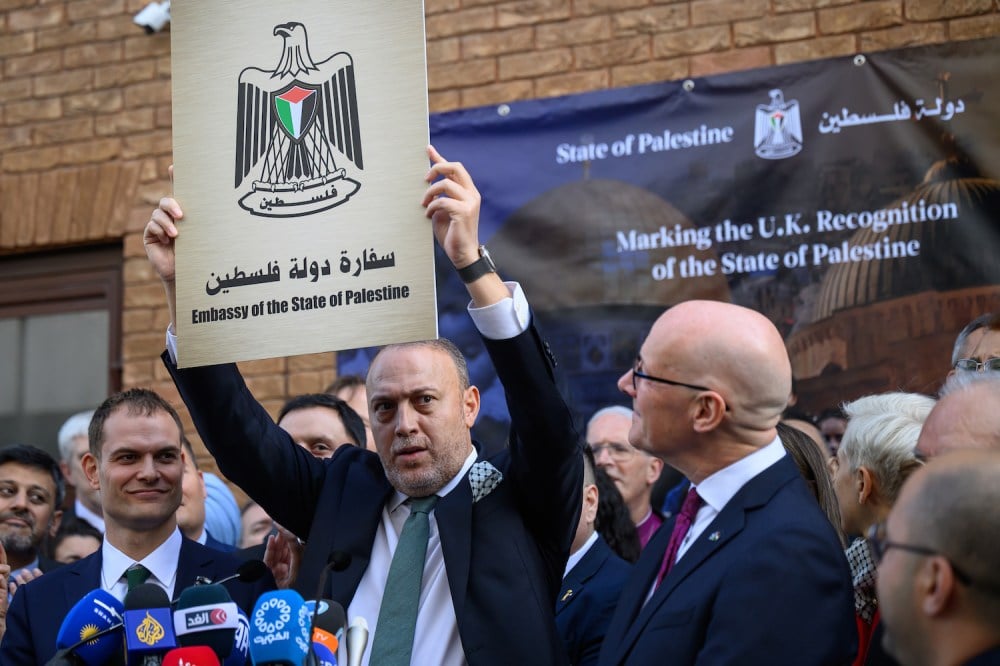Welcome back to World Brief, where we’re looking at a two-state solution conference at the United Nations General Assembly, a rare U.S. congressional trip to China, and NATO claiming that Russia violated Estonia’s airspace.
Recognizing Palestine
The 80th annual United Nations General Assembly (UNGA) kicked off its high-level week in New York City on Monday, with more than 140 world leaders converging to discuss the day’s biggest geopolitical flash points, from Russia’s war in Ukraine to climate change.
But perhaps the biggest headline this week may come from the summit’s sidelines, with France and Saudi Arabia co-hosting a conference on Monday to determine how best to implement a two-state solution to the Israeli-Palestinian conflict. “Palestine is going to be the huge elephant in this session of the General Assembly,” said Riyad Mansour, the Palestinian ambassador to the United Nations.
The two-state solution, which envisions sovereign Israeli and Palestinian states coexisting peacefully side by side, has long been the leading framework to establish lasting peace in the conflict and served as the bedrock of the Oslo Accords in the 1990s. However, the process of establishing a two-state solution has suffered numerous setbacks and encountered stiff resistance, and in recent years, hope for such an arrangement has all but died out.
However, Paris and Riyadh gave the two-state solution a lifeline in July by proposing the New York Declaration, which calls for a “just, peaceful and lasting settlement of the Israeli-Palestinian conflict based on the effective implementation of the two-State solution” and lays out a road map for how to get there. The U.N. General Assembly adopted the New York Declaration by a wide margin on Sept. 12.
In support of that declaration, several countries have used this year’s UNGA to announce their formal recognition of an independent Palestinian state. Before this week’s high-level summit, more than 145 nations recognized Palestine. On Sunday, Australia, Canada, Portugal, and the United Kingdom joined that list, and on Monday, Belgium, France, Luxembourg, Malta, and San Marino were expected to follow.
This is an “important and necessary step toward achieving a just and lasting peace,” Palestinian President Mahmoud Abbas said following Sunday’s slew of recognitions. The Trump administration refused to issue a U.S. visa to Abbas to attend UNGA, but last Friday, the General Assembly overwhelmingly adopted a resolution enabling Abbas to submit a prerecorded video speech, to be played on Thursday.
Although recognizing a Palestinian state is expected to boost morale for those in the occupied territories, it is largely seen as a symbolic gesture that will do little to deliver much-needed change on the ground, where Gaza is experiencing a catastrophic humanitarian crisis and the West Bank is seeing a sharp rise in Jewish settler attacks against Palestinians and increased Israeli military raids, among other challenges.
On Sunday, Israeli Prime Minister Benjamin Netanyahu vowed to never recognize a Palestinian state. Both Israel and the United States boycotted Monday’s two-state solution meeting, with Danny Danon, Israel’s ambassador to the United Nations, calling the event a “circus.” And Israeli officials have warned that recognizing Palestine could lead to retribution measures, such annexing new parts of the West Bank.
The U.N. Security Council is expected to hold a meeting on the situation in Gaza and the wider Middle East on Tuesday.
Today’s Most Read
- How China Called America’s Bluff by Ravi Agrawal
- America’s Infuriating and Irreplaceable Role at the U.N. by Richard Gowan
- What We’ll Be Watching for at UNGA by John Haltiwanger and Rishi Iyengar
The World This Week
Wednesday, Sept. 24: French Prime Minister Sébastien Lecornu holds talks with union representatives to discuss potential spending cuts.
Thursday, Sept. 25: U.S. President Donald Trump hosts Turkish President Recep Tayyip Erdogan at the White House.
Friday, Sept. 26: NATO defense chiefs gather in Latvia for a two-day conference.
Saturday, Sept. 27: Gabon holds the first round of legislative and local elections.
Seychelles holds a general election.
Sunday, Sept. 28: U.N. snapback sanctions on Iran are scheduled to go into effect.
Moldova holds parliamentary elections.
Switzerland holds its quarterly referendum.
Monday, Sept. 29: Trump hosts Netanyahu at the White House.
What We’re Following
Ice-breaking trip. U.S. Rep. Adam Smith led a bipartisan congressional delegation to meet with Chinese Defense Minister Dong Jun in Beijing on Monday. The rare trip, which began Sunday, was the first time that a member of the U.S. House of Representatives had visited China since 2019.
“We want to open up better the lines of communication between our two countries in general, in particular between our defense [structures],” Smith, the top Democrat on the House Armed Services Committee, told Dong. “We have disagreements, without question, but I think it makes it all the more important that we have open discussions about how to resolve those differences.” The delegation also separately met with Chinese Premier Li Qiang and Vice Premier He Lifeng.
China suspended regular military-to-military communications with the United States in August 2022, after then-U.S. House Speaker Nancy Pelosi traveled to Taiwan. A rare meeting between Chinese President Xi Jinping and then-U.S. President Joe Biden in November 2023 restored military dialogue, but tensions remained high this year after Trump imposed sweeping tariffs on Chinese goods.
Still, the White House is making several moves to alleviate these concerns, including by inching closer to a major TikTok divestment deal. Trump and Xi are also expected to meet on the sidelines of the Asia-Pacific Economic Cooperation summit in South Korea, which begins Oct. 31.
Moscow’s latest incursion. Russia accused Estonia on Monday of falsely claiming that three Russian MiG-31 fighter jets had violated Estonian airspace last Friday for a total of 12 minutes before being forced to withdraw. Tallinn does not have “objective monitoring data,” Kremlin spokesperson Dmitry Peskov said. “That is why we consider such words to be empty, unfounded, and a continuation of a completely reckless pattern of escalating tensions and provoking a confrontational atmosphere.”
Whether the border violation was deliberate still “needs to be confirmed,” said Col. Ants Kiviselg, the commander of Estonia’s Military Intelligence Center. But Tallinn maintains that Russia’s incursion did occur and suggested that it was designed to draw the alliance’s resources away from Ukraine.
A similar incident occurred earlier this month, when more than a dozen Russian drones entered Polish airspace without permission, forcing NATO fighter jets to mobilize. Warsaw quickly activated NATO’s Article 4 clause and pledged to bolster its eastern border.
The U.N. Security Council convened an emergency session on Monday to discuss Estonia’s accusations—the first time that Tallinn has requested such a meeting in 34 years.
Mass protests. Tens of thousands of Brazilians took to the streets on Sunday to protest legislation that could pardon convicted former President Jair Bolsonaro and his allies. If passed by the Senate, the amendment would make it harder to arrest or hold criminal proceedings against lawmakers. Brazil’s right-wing opposition fast-tracked the bill through the country’s lower house last Tuesday, just days after Bolsonaro was sentenced to 27 years and three months in prison for orchestrating an attempted coup after losing the 2022 presidential election.
Sunday’s protests, organized by artists and left-wing groups, were held in all of Brazil’s 26 states as well as its federal district. Yet national polling shows a divided country. According to a recent Datafolha poll, 50 percent of respondents said Bolsonaro should be jailed, whereas 43 percent disagreed.
The Philippines also saw mass, largely peaceful demonstrations on Sunday, with thousands of people protesting alleged government misappropriation of public funds. At least 49 people were arrested for targeting police and blocking roads to the presidential palace, though, and around 70 law enforcement officers were injured in Manila.
President Ferdinand Marcos Jr. revealed during his State of the Nation address in July that several flood relief projects were riddled with anomalies, which the environmental activist group Greenpeace later estimated amounted to roughly $17.6 billion in embezzled funds. In response to the scandal, Marcos and a Senate committee have launched separate, independent investigations, and both the Senate president and House speaker have been replaced.
Odds and Ends
If you’re really hungry, Nigerian chef Hilda Baci has you covered. The celebrity cook secured a Guinness World Record by preparing the largest-ever pot of jollof rice on Sept. 12, the organization confirmed last week. Weighing more than 19,000 pounds, the massive meal took nine hours, a weight-bearing crane, and a large team to cook. Baci previously made history in 2023, when she broke the world record for longest cooking marathon at 93 hours and 11 minutes.
The post The Two-State Solution Takes Center Stage at UNGA appeared first on Foreign Policy.




